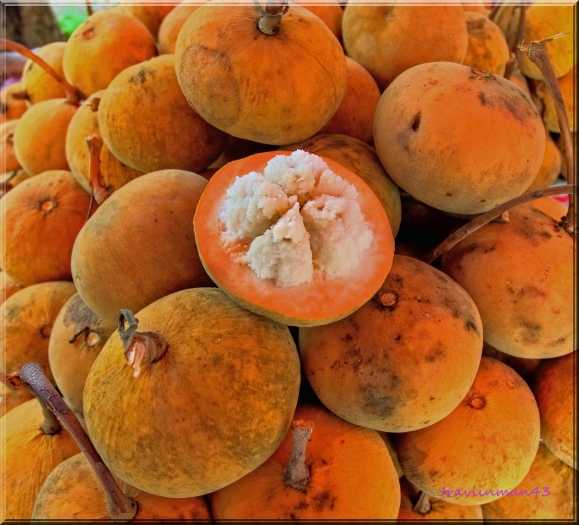Red Santol
(Sandoricum koetjape)
Red Santol (Sandoricum koetjape)
/
/

Steve
CC BY-SA 2.0
Image By:
Steve
Recorded By:
Copyright:
CC BY-SA 2.0
Copyright Notice:
Photo by: Steve | License Type: CC BY-SA 2.0 | License URL: https://creativecommons.org/licenses/by-sa/2.0 | Uploader: Flickr upload bot | Publisher: Wikipedia Commons |

































Estimated Native Range
Summary
Sandoricum koetjape, commonly known as the Red Santol, is a tropical fruit tree native to Southeast Asia, specifically the Malesian ecoregion, which includes Malaysia, Indonesia, and the Philippines. It is a fast-growing tree that can reach heights of 50-150 feet (15-46 meters) and widths of 30-60 feet (9-18 meters), with a dense, rounded canopy. The Red Santol is notable for its lush green foliage and the striking contrast of reddish older leaves before they fall. It produces inconspicuous green and cream flowers in the spring, followed by the distinctive fruits for which it is cultivated.
The Red Santol is valued for its large, peach-like fruits that have a slightly fuzzy texture and a reddish tinge. The fruits can be eaten fresh or used in cooking and are known for their unique flavor, which combines the sweetness of peaches with the texture of apples. The tree is also appreciated for its ornamental qualities, with the reddish leaves adding to its visual appeal. In cultivation, it requires full sun to part shade, medium water, and well-drained soils. It is often planted in tropical gardens, orchards, and as a street tree in urban areas. While it is not particularly drought-tolerant, it can withstand short dry periods. Fertilization is recommended twice a year to promote healthy growth. Seed trees typically begin to bear fruit at 5 to 7 years of age, although some cultivars may produce fruit as early as 3 to 4 years. A mature Red Santol tree can be highly productive, yielding between 18,000 and 24,000 fruits annually. It is important to space trees 20 to 25 feet (6.1 to 7.6 meters) apart when planting. Potential problems include fruit flies, which can affect fruit quality, and root rot in poorly drained soils.CC BY-SA 4.0
The Red Santol is valued for its large, peach-like fruits that have a slightly fuzzy texture and a reddish tinge. The fruits can be eaten fresh or used in cooking and are known for their unique flavor, which combines the sweetness of peaches with the texture of apples. The tree is also appreciated for its ornamental qualities, with the reddish leaves adding to its visual appeal. In cultivation, it requires full sun to part shade, medium water, and well-drained soils. It is often planted in tropical gardens, orchards, and as a street tree in urban areas. While it is not particularly drought-tolerant, it can withstand short dry periods. Fertilization is recommended twice a year to promote healthy growth. Seed trees typically begin to bear fruit at 5 to 7 years of age, although some cultivars may produce fruit as early as 3 to 4 years. A mature Red Santol tree can be highly productive, yielding between 18,000 and 24,000 fruits annually. It is important to space trees 20 to 25 feet (6.1 to 7.6 meters) apart when planting. Potential problems include fruit flies, which can affect fruit quality, and root rot in poorly drained soils.CC BY-SA 4.0
Plant Description
- Plant Type: Tree
- Height: 50-150 feet
- Width: 30-60 feet
- Growth Rate: Moderate
- Flower Color: Cream, Green
- Flowering Season: Spring
- Leaf Retention: Evergreen
Growth Requirements
- Sun: Full Sun, Part Shade
- Water: Medium
- Drainage: Medium
Common Uses
Edible*Disclaimer: Easyscape's listed plant edibility is for informational use. Always verify the safety and proper identification of any plant before consumption.
Natural Habitat
Native to Southeast Asia, specifically the Malesian ecoregion
Other Names
Common Names: Kechapi , Sentol , Cotton Fruit , Lolly Fruit , Ranggu , Yellow Sentol , Sandoribaum , Faux Mangoustan , Sandorique , Sentul
Scientific Names: Sandoricum koetjape , Sandoricum indicum , Sandoricum nervosum , Sandoricum vidalii , Sandoricum maingayi , Sandoricum harmsianum , Sandoricum radiatum , Sandoricum ternatum , Trichilia nervosa , Azedarach edule
GBIF Accepted Name: Sandoricum koetjape Merr.